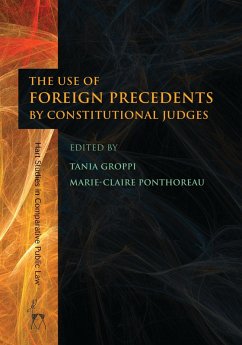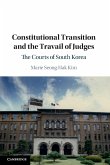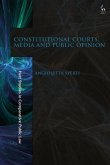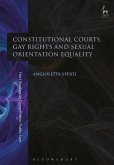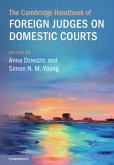Use of Foreign Precedents by Constitutional Judges
Herausgeber: Groppi, Tania; Ponthoreau, Marie-Claire
Use of Foreign Precedents by Constitutional Judges
Herausgeber: Groppi, Tania; Ponthoreau, Marie-Claire
- Broschiertes Buch
- Merkliste
- Auf die Merkliste
- Bewerten Bewerten
- Teilen
- Produkt teilen
- Produkterinnerung
- Produkterinnerung
In 2007 the International Association of Constitutional Law established an Interest Group to conduct a survey of the use of foreign precedents by Supreme and Constitutional Courts. This results of the survey, presented here, gives us the best evidence yet of the existence, and extent, of a transnational constitutional dialogue between courts.
Andere Kunden interessierten sich auch für
![Constitutional Transition and the Travail of Judges Constitutional Transition and the Travail of Judges]() Marie Seong-Hak Kim (Minnesota St Cloud State University)Constitutional Transition and the Travail of Judges47,99 €
Marie Seong-Hak Kim (Minnesota St Cloud State University)Constitutional Transition and the Travail of Judges47,99 €![Constitutional Courts, Media and Public Opinion Constitutional Courts, Media and Public Opinion]() Angioletta Sperti (Italy University of Pisa)Constitutional Courts, Media and Public Opinion139,99 €
Angioletta Sperti (Italy University of Pisa)Constitutional Courts, Media and Public Opinion139,99 €![Constitutional Courts, Gay Rights and Sexual Orientation Equality Constitutional Courts, Gay Rights and Sexual Orientation Equality]() Angioletta SpertiConstitutional Courts, Gay Rights and Sexual Orientation Equality118,99 €
Angioletta SpertiConstitutional Courts, Gay Rights and Sexual Orientation Equality118,99 €![Judicial Dissent in European Constitutional Courts Judicial Dissent in European Constitutional Courts]() Katalin KelemenJudicial Dissent in European Constitutional Courts175,99 €
Katalin KelemenJudicial Dissent in European Constitutional Courts175,99 €![Clark's Publishing Agreements: A Book of Precedents Clark's Publishing Agreements: A Book of Precedents]() Lynette OwenClark's Publishing Agreements: A Book of Precedents247,99 €
Lynette OwenClark's Publishing Agreements: A Book of Precedents247,99 €![The Cambridge Handbook of Foreign Judges on Domestic Courts The Cambridge Handbook of Foreign Judges on Domestic Courts]() The Cambridge Handbook of Foreign Judges on Domestic Courts251,99 €
The Cambridge Handbook of Foreign Judges on Domestic Courts251,99 €![The Basque Witch-Hunt The Basque Witch-Hunt]() Dr Jan Machielsen (UK Cardiff University)The Basque Witch-Hunt19,99 €
Dr Jan Machielsen (UK Cardiff University)The Basque Witch-Hunt19,99 €-
-
-
In 2007 the International Association of Constitutional Law established an Interest Group to conduct a survey of the use of foreign precedents by Supreme and Constitutional Courts. This results of the survey, presented here, gives us the best evidence yet of the existence, and extent, of a transnational constitutional dialogue between courts.
Produktdetails
- Produktdetails
- Hart Studies in Comparative Public Law
- Verlag: Bloomsbury Publishing PLC
- Seitenzahl: 472
- Erscheinungstermin: 1. Mai 2014
- Englisch
- Abmessung: 244mm x 170mm x 25mm
- Gewicht: 836g
- ISBN-13: 9781849466592
- ISBN-10: 1849466599
- Artikelnr.: 40311096
- Herstellerkennzeichnung
- Libri GmbH
- Europaallee 1
- 36244 Bad Hersfeld
- gpsr@libri.de
- Hart Studies in Comparative Public Law
- Verlag: Bloomsbury Publishing PLC
- Seitenzahl: 472
- Erscheinungstermin: 1. Mai 2014
- Englisch
- Abmessung: 244mm x 170mm x 25mm
- Gewicht: 836g
- ISBN-13: 9781849466592
- ISBN-10: 1849466599
- Artikelnr.: 40311096
- Herstellerkennzeichnung
- Libri GmbH
- Europaallee 1
- 36244 Bad Hersfeld
- gpsr@libri.de
Tania Groppi is Professor of Public Law at the University of Siena.Marie-Claire Ponthoreau is Professor of Constitutional Law and Comparative Law at the University of Bordeaux.
Introduction. The Methodology of the Research: How to Assess the Reality of
Transjudicial Communication?
Tania Groppi and Marie-Claire Ponthoreau
Part I
1. Reference to Foreign Precedents by the Australian High Court: A Matter
of Method
Cheryl Saunders and Adrienne Stone
2. Canada: Protecting Rights in a 'Worldwide Rights Culture'. An Empirical
Study of the Use of Foreign Precedents by the Supreme Court of Canada
(1982-2010)
Gianluca Gentili
3. India: A 'Critical' Use of Foreign Precedents in Constitutional
Adjudication
Valentina Rita Scotti
4. The Supreme Court of Ireland and the Use of Foreign Precedents: The
Value of Constitutional History
Cristina Fasone
5. Israel: Creating a Constitution-The Use of Foreign Precedents by the
Supreme Court (1994-2010)
Suzie Navot
6. Namibia: The Supreme Court as a Foreign Law Importer
Irene Spigno
7. South Africa: Teaching an 'Old Dog' New Tricks? An Empirical Study
of the Use of Foreign Precedents by the South African Constitutional Court
(1995-2010)
Christa Rautenbach
Part II
8. Austria: Non-cosmopolitan, but Europe-friendly-The Constitutional
Court's Comparative Approach
Anna Gamper
vi Contents
9. Lifting the Constitutional Curtain? The Use of Foreign Precedent by the
German Federal Constitutional Court
Stefan Martini
10. Hungary: Unsystematic and Incoherent Borrowing of Law. The Use of
Foreign Judicial Precedents in the Jurisprudence of the Constitutional
Court, 1999-2010
Zoltán Szente
11. A Gap between the Apparent and Hidden Attitudes of the Supreme Court of
Japan towards Foreign Precedents
Akiko Ejima
12. Mexico: Struggling for an Open View In Constitutional Adjudication
Eduardo Ferrer Mac-Gregor and Rubén Sánchez Gil
13. Romania: Analogical Reasoning as a Dialectical Instrument
Elena Simina Tanasescu and Stefan Deaconu
14. Russia: Foreign Transplants in the Russian Constitution and Invisible
Foreign Precedents in Decisions of the Russian Constitutional Court
Sergey Belov
15. Judges as Discursive Agent: The Use of Foreign Precedents by the
Constitutional Court of Taiwan
Wen-Chen Chang and Jiunn-Rong Yeh
16. United States of America: First Cautious Attempts of Judicial Use of
Foreign Precedents in the Supreme Court's Jurisprudence
Angioletta Sperti
Conclusion. The Use of Foreign Precedents by Constitutional Judges: A
Limited Practice, An Uncertain Future
Tania Groppi and Marie-Claire Ponthoreau
Transjudicial Communication?
Tania Groppi and Marie-Claire Ponthoreau
Part I
1. Reference to Foreign Precedents by the Australian High Court: A Matter
of Method
Cheryl Saunders and Adrienne Stone
2. Canada: Protecting Rights in a 'Worldwide Rights Culture'. An Empirical
Study of the Use of Foreign Precedents by the Supreme Court of Canada
(1982-2010)
Gianluca Gentili
3. India: A 'Critical' Use of Foreign Precedents in Constitutional
Adjudication
Valentina Rita Scotti
4. The Supreme Court of Ireland and the Use of Foreign Precedents: The
Value of Constitutional History
Cristina Fasone
5. Israel: Creating a Constitution-The Use of Foreign Precedents by the
Supreme Court (1994-2010)
Suzie Navot
6. Namibia: The Supreme Court as a Foreign Law Importer
Irene Spigno
7. South Africa: Teaching an 'Old Dog' New Tricks? An Empirical Study
of the Use of Foreign Precedents by the South African Constitutional Court
(1995-2010)
Christa Rautenbach
Part II
8. Austria: Non-cosmopolitan, but Europe-friendly-The Constitutional
Court's Comparative Approach
Anna Gamper
vi Contents
9. Lifting the Constitutional Curtain? The Use of Foreign Precedent by the
German Federal Constitutional Court
Stefan Martini
10. Hungary: Unsystematic and Incoherent Borrowing of Law. The Use of
Foreign Judicial Precedents in the Jurisprudence of the Constitutional
Court, 1999-2010
Zoltán Szente
11. A Gap between the Apparent and Hidden Attitudes of the Supreme Court of
Japan towards Foreign Precedents
Akiko Ejima
12. Mexico: Struggling for an Open View In Constitutional Adjudication
Eduardo Ferrer Mac-Gregor and Rubén Sánchez Gil
13. Romania: Analogical Reasoning as a Dialectical Instrument
Elena Simina Tanasescu and Stefan Deaconu
14. Russia: Foreign Transplants in the Russian Constitution and Invisible
Foreign Precedents in Decisions of the Russian Constitutional Court
Sergey Belov
15. Judges as Discursive Agent: The Use of Foreign Precedents by the
Constitutional Court of Taiwan
Wen-Chen Chang and Jiunn-Rong Yeh
16. United States of America: First Cautious Attempts of Judicial Use of
Foreign Precedents in the Supreme Court's Jurisprudence
Angioletta Sperti
Conclusion. The Use of Foreign Precedents by Constitutional Judges: A
Limited Practice, An Uncertain Future
Tania Groppi and Marie-Claire Ponthoreau
Introduction. The Methodology of the Research: How to Assess the Reality of
Transjudicial Communication?
Tania Groppi and Marie-Claire Ponthoreau
Part I
1. Reference to Foreign Precedents by the Australian High Court: A Matter
of Method
Cheryl Saunders and Adrienne Stone
2. Canada: Protecting Rights in a 'Worldwide Rights Culture'. An Empirical
Study of the Use of Foreign Precedents by the Supreme Court of Canada
(1982-2010)
Gianluca Gentili
3. India: A 'Critical' Use of Foreign Precedents in Constitutional
Adjudication
Valentina Rita Scotti
4. The Supreme Court of Ireland and the Use of Foreign Precedents: The
Value of Constitutional History
Cristina Fasone
5. Israel: Creating a Constitution-The Use of Foreign Precedents by the
Supreme Court (1994-2010)
Suzie Navot
6. Namibia: The Supreme Court as a Foreign Law Importer
Irene Spigno
7. South Africa: Teaching an 'Old Dog' New Tricks? An Empirical Study
of the Use of Foreign Precedents by the South African Constitutional Court
(1995-2010)
Christa Rautenbach
Part II
8. Austria: Non-cosmopolitan, but Europe-friendly-The Constitutional
Court's Comparative Approach
Anna Gamper
vi Contents
9. Lifting the Constitutional Curtain? The Use of Foreign Precedent by the
German Federal Constitutional Court
Stefan Martini
10. Hungary: Unsystematic and Incoherent Borrowing of Law. The Use of
Foreign Judicial Precedents in the Jurisprudence of the Constitutional
Court, 1999-2010
Zoltán Szente
11. A Gap between the Apparent and Hidden Attitudes of the Supreme Court of
Japan towards Foreign Precedents
Akiko Ejima
12. Mexico: Struggling for an Open View In Constitutional Adjudication
Eduardo Ferrer Mac-Gregor and Rubén Sánchez Gil
13. Romania: Analogical Reasoning as a Dialectical Instrument
Elena Simina Tanasescu and Stefan Deaconu
14. Russia: Foreign Transplants in the Russian Constitution and Invisible
Foreign Precedents in Decisions of the Russian Constitutional Court
Sergey Belov
15. Judges as Discursive Agent: The Use of Foreign Precedents by the
Constitutional Court of Taiwan
Wen-Chen Chang and Jiunn-Rong Yeh
16. United States of America: First Cautious Attempts of Judicial Use of
Foreign Precedents in the Supreme Court's Jurisprudence
Angioletta Sperti
Conclusion. The Use of Foreign Precedents by Constitutional Judges: A
Limited Practice, An Uncertain Future
Tania Groppi and Marie-Claire Ponthoreau
Transjudicial Communication?
Tania Groppi and Marie-Claire Ponthoreau
Part I
1. Reference to Foreign Precedents by the Australian High Court: A Matter
of Method
Cheryl Saunders and Adrienne Stone
2. Canada: Protecting Rights in a 'Worldwide Rights Culture'. An Empirical
Study of the Use of Foreign Precedents by the Supreme Court of Canada
(1982-2010)
Gianluca Gentili
3. India: A 'Critical' Use of Foreign Precedents in Constitutional
Adjudication
Valentina Rita Scotti
4. The Supreme Court of Ireland and the Use of Foreign Precedents: The
Value of Constitutional History
Cristina Fasone
5. Israel: Creating a Constitution-The Use of Foreign Precedents by the
Supreme Court (1994-2010)
Suzie Navot
6. Namibia: The Supreme Court as a Foreign Law Importer
Irene Spigno
7. South Africa: Teaching an 'Old Dog' New Tricks? An Empirical Study
of the Use of Foreign Precedents by the South African Constitutional Court
(1995-2010)
Christa Rautenbach
Part II
8. Austria: Non-cosmopolitan, but Europe-friendly-The Constitutional
Court's Comparative Approach
Anna Gamper
vi Contents
9. Lifting the Constitutional Curtain? The Use of Foreign Precedent by the
German Federal Constitutional Court
Stefan Martini
10. Hungary: Unsystematic and Incoherent Borrowing of Law. The Use of
Foreign Judicial Precedents in the Jurisprudence of the Constitutional
Court, 1999-2010
Zoltán Szente
11. A Gap between the Apparent and Hidden Attitudes of the Supreme Court of
Japan towards Foreign Precedents
Akiko Ejima
12. Mexico: Struggling for an Open View In Constitutional Adjudication
Eduardo Ferrer Mac-Gregor and Rubén Sánchez Gil
13. Romania: Analogical Reasoning as a Dialectical Instrument
Elena Simina Tanasescu and Stefan Deaconu
14. Russia: Foreign Transplants in the Russian Constitution and Invisible
Foreign Precedents in Decisions of the Russian Constitutional Court
Sergey Belov
15. Judges as Discursive Agent: The Use of Foreign Precedents by the
Constitutional Court of Taiwan
Wen-Chen Chang and Jiunn-Rong Yeh
16. United States of America: First Cautious Attempts of Judicial Use of
Foreign Precedents in the Supreme Court's Jurisprudence
Angioletta Sperti
Conclusion. The Use of Foreign Precedents by Constitutional Judges: A
Limited Practice, An Uncertain Future
Tania Groppi and Marie-Claire Ponthoreau

